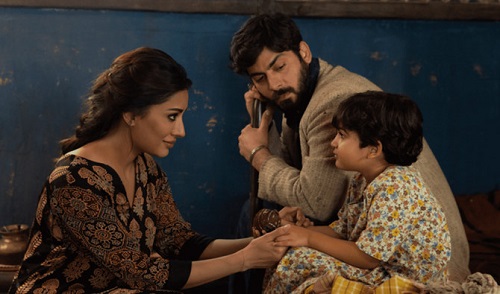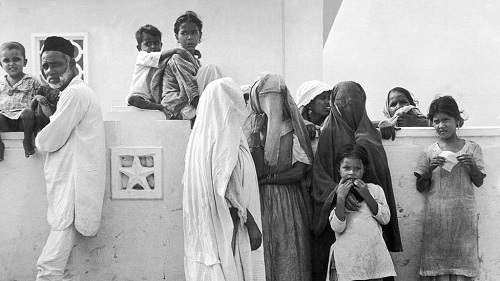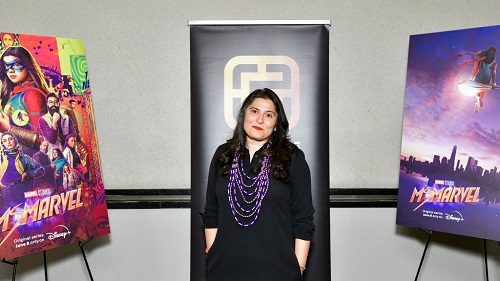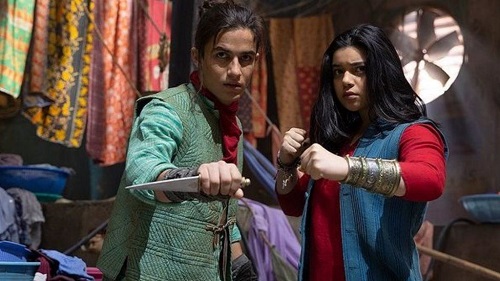BBC
Ms. Marvel : The India-Pakistan Trauma at the Heart of the Show
By Zoya Mateen and Meryl Sebastian
BBC News, Delhi
"My passport is Pakistani and my roots are Indian. And in between is a border, built with blood and pain."
It's not often that you find a character in an American show speaking about India and Pakistan. But Ms Marvel, which features a teenage Muslim superhero, seems to be changing the discourse.
The line - spoken by Sana, the grandmother of the show's heroine Kamala Khan - refers to the 1947 partition which led to the creation of two independent nations, India and Pakistan.

Kamala's great-grandparents were separated during the partition in 1947 - Arab News Pakistan
Critics have praised the six-episode show for depicting that traumatic event with nuance and sensitivity.
The partition, which happened at the end of British colonial rule in India, was the biggest movement of people in history, outside war and famine. About 12 million people became refugees and between 500,000 and a million people were killed in religious violence.
Film industries in both India and Pakistan have portrayed the anguish and sorrow of partition on screen. But Ms Marvel depicts it through the lens of the present, creating a multi-generational story of trauma, loss and identity.
Writer Aanchal Malhotra, who has documented oral histories of partition in her books, says the show transforms its research into "something that is meaningful, emotionally coherent and accurate".
"It does a good job of picking up faultlines from history that have continued into the present day," she says.

The partition of India and Pakistan created millions of refugees - Getty Images
Ms Marvel traces the story of Kamala - played by Iman Vellani - a Pakistani American teenager who transforms into a superhero.
The character first appeared in a solo comic book series in 2014. There, Kamala's abilities - stemmed by a secret alien gene - are activated by a mutagenic gas. But in the show, Kamala gets her powers from a mysterious bangle that belonged to her great-grandmother Aisha, who disappeared during the partition.
Ms Malhotra says she was fascinated that the show's makers chose a family heirloom as the vehicle for superpowers.
"People carried heirlooms across the [India-Pakistan] border and in the show, it's literally the portal to the past," she says. "For younger generations that don't know anything about the cataclysmic events of 1947, an object can be a starting point to enter the past. And that's exactly what happens with Kamala too."
For Ms Malhotra and many others, the best part of the show is that partition is not a background trope or a faint memory, but "something that holds the entire story together".
That is perhaps clearest in the fifth episode. The signature Marvel track is replaced by the melancholic Tu Mera Chand (You Are My Moon), a 1949 song sung by actors Shyam and Suraiya who were both from a region in Punjab that became a part of Pakistan. Then a newsreel begins to play - it shows a montage of India's first prime minister Jawaharlal Nehru and Pakistan's founder Muhammad Ali Jinnah, interposed with scenes of violence that marked the partition.
A flashback introduces us to Kamala's great-grandmother Aisha and her husband Hasan, setting the stage for the larger revelations that follow.
We learn that Kamala's maternal family was among the millions of Muslims who crossed over to Pakistan in 1947. Aisha and Hasan are separated while trying to get on the last train to Karachi. Sana - just a toddler then - miraculously manages to unite with her father.
Sharmeen Obaid-Chinoy, who directed the partition episodes, transports Kamala into that painful moment which changes her family and history. Through the teenager's eyes, viewers see a sea of people at the railway station, some searching desperately for a place in the crowded train, others bidding tearful farewells to their families.
The voices and conversations the audience hears were drawn from oral histories recorded in the Citizen's Archive of Pakistan and the Citizen's Archive of India - two independent archives.
Ms Obaid-Chinoy told the BBC that she wanted to convey the scale and anguish of the event.
"I was looking for iconic images that would be emblematic of the pain, the horror, the despair people felt when they were leaving their homes. I wanted to transport audiences right into that time - what people were carrying with them, the body language, the look on their faces," she says.
The result is an immersive experience as viewers live the moment with Kamala, who moves through the crowd as helplessly as the other people there.
"When she first lands into partition, she's not a superhero, she is Kamala Khan," the director says.

Sharmeen Obaid-Chinoy directed the partition episodes of Ms Marvel – Getty Images
In Ms Marvel, partition is not a relic of the past, but a touchstone carried across generations. Kamala cannot experience her grandmother's trauma and pain, but what she sees at that railway station comes to define her identity.
While superhuman elements are a major part of the show, there are other, more personal themes. Like Kamala, many South Asians have grown up with stories of Hindus and Muslims living in harmony until the violence began; of a family member who never made it across the border alive.
Ms Malhotra says that many people who lived though the Partition are still reckoning with it - and that unresolved feeling has passed down generations. "And you can imagine what Kamala feels like, being thrown into the very center of it."
Apart from Kamala, other characters are also on a quest to find their place in the world.
For Sana, partition was an event which was impossible to prepare for. But she spends a lifetime looking back at it, trying to understand and accept it.
Ms Malhotra says that the conversations between Kamala and her grandmother give an insight into the difficulty of dealing with inter-generational trauma.
"Kamala's grandmother may feel things but she doesn't say everything - you understand that there is history deeper than what she's letting on. But she also knows that Kamala will have to discover it on her own," she says.
Kamala's mum Muneeba leaves Pakistan to get away from the past and a mother who seems too caught up in her trauma - but in the US, she finds that she wants to firmly hold on to the morals and habits she grew up with. When she returns to Karachi after years, she is relieved to find that it still feels like home.

Kamala gets her powers from a bangle, which is a family heirloom – Disney/Instagram
Unlike her mum, Kamala doesn't try to run away from her identity, but she does try to balance her desire for freedom with her family's rules. It's a classic Asian American tale of straddling dual worlds, dealing with conservative parents and finding one's place in school.
But the duality of her identity goes beyond the seeming generational conflict.
Kamala is half-djinn and half-human. She lives in this world but her ancestors are from another universe. She never derides her South Asian roots, but she feels like an outsider in Karachi. When she discovers her powers, there's a sudden awareness of the future looming, accelerating. But to understand this, she must unlock her family's past first.
In the end, the ability to navigate two worlds both becomes and fuels Kamala's superpower. And the bangle becomes the centerpiece of this journey, leading her to a past that was otherwise unknown to her.
Every generation, Ms Malhotra says, has to "descend into themselves" to understand their family's history and its impact on their life.
"Without it, there remains many unknowns. Even if you are a superhero like Kamala." – BBC

